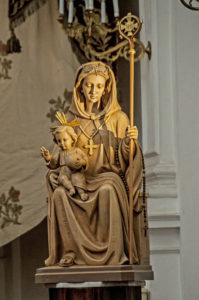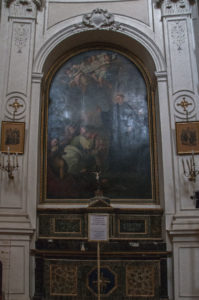Not far from the church of San Giuseppe (St. Joseph) is Porta Walter. It was built in medieval times and allowed people to leave the city and visit the lush green valley of Santa Domenica.
From here they would reach a spring where inhabitants rushed to quench their thirst and collect as much water as possible, especially on long, sweltering summer days!
Depending on the time of day, the levels of the façade and its various elements create a unique and fascinating combination of light effects.
The plays of light and shadow change from hour to hour.
The endless chiaroscuro effects uncover and hide new details each time.
The church brings out the diversity of the materials and the infinite possibilities for their use. As a matter of fact, the glass used in the large windows of the vault was also used to decorate the altars with a process that imitates marble.
Used for the worshippers’ seating, wood also proves to be an excellent material for beautiful wooden sculptures such as the Madonna near the altar.

